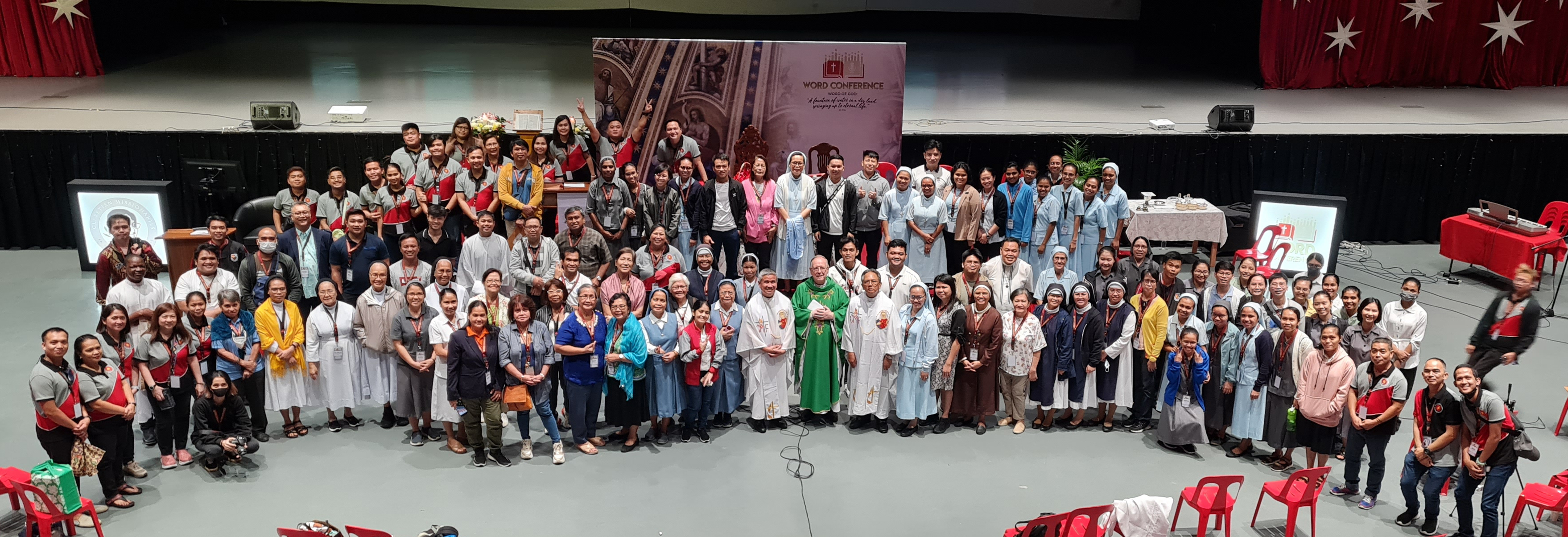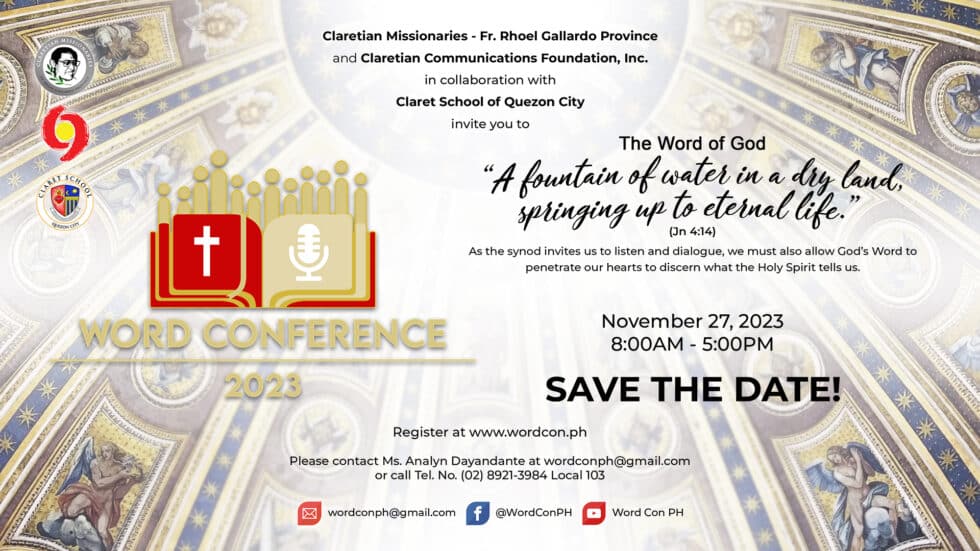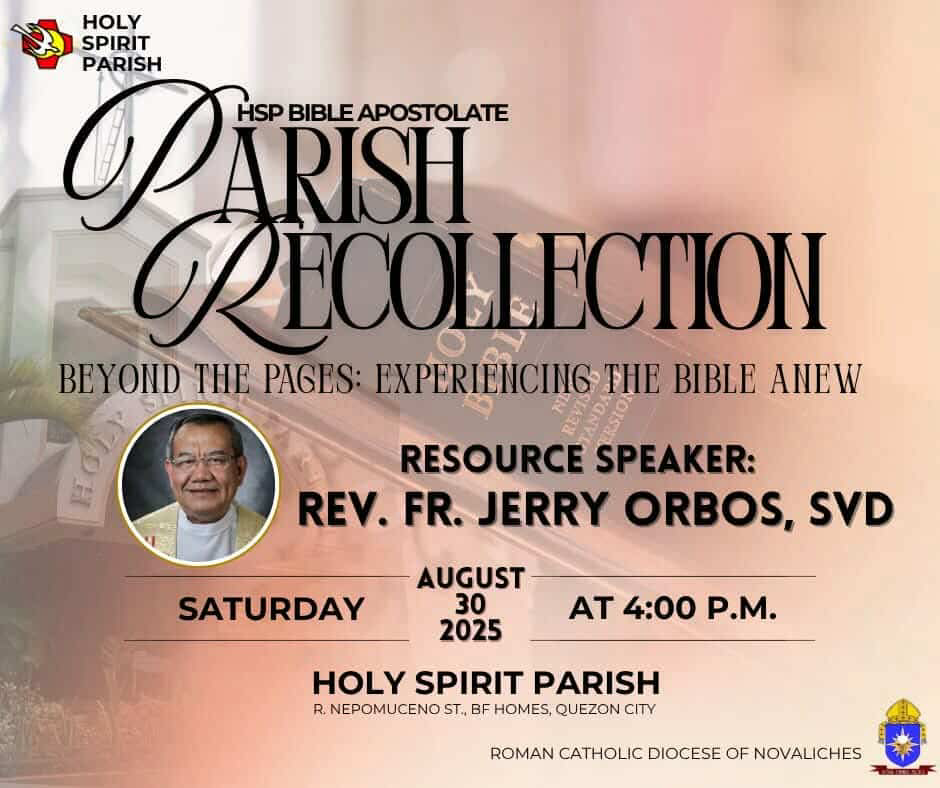
This is the plenary speech delivered by Bishop Ambo David on October 4, 2016 during the 1st Bible Congress in Laoag City, Ilocos Norte organized by the Episcopal Commission on the Biblical Apostolate.
by Bishop Ambo David
The Word of God is not just an aspect, a component, or “an element of the Church’s life and mission”. Fr Tony Pernia SVD was applauded in the Synod hall when he said this, in 2008. It is at the very core of the Church’s life and mission, he said. (Especially considering that the WG for us refers not just to Sacred Scriptures but the person of Jesus Christ, the divine word made flesh, how can we not say the WG IS THE VERY LIFE AND MISSION OF THE CHURCH?) Perhaps that is why the English title of the Vat 2 document DEI VERBUM is not “Word of God” but DIVINE REVELATION. It has to do with the whole dynamics of God’s communication with humankind and the world. This divine communication is a dynamic that involves three things on our part: 1&2) listening & responding to God’s Word (as constitutive of the Church’s life of discipleship), and 3) proclaiming God’s Word to the World (as constitutive of the Church’s apostleship/ mission).
1) LISTENING to the God who speaks (VD 6-21)
God reaches out to humankind in order to invite us to a covenant relationship. How can we hear Him unless He speaks in a language we can understand? He has therefore made himself understood though his Creation, through agents, through the Scriptures and ultimately through His Son. See Hebrews 1:1-4. He has endowed us with rational, perceptional, spiritual intelligences that make us capable of “hearing” or listening to Him, of processing and understanding his message.
HEAR! This is the opening word of the so-called “great commandment”. (Deut 6:4-9) SHEMA YISRAEL, hear Israel! We are asked not just to hear God’s word but to “take it to heart… To drill them (keep repeating them, NAB), meaning, allow them to sink in deeply into our souls, recite them ‘when you are at home or you are away; when you lie down or when you get up… Make them visible for the sake of recall; ‘bind them at your arm as a sign… or as a pendant on your forehead, …or on the doorposts of your houses and on your gates.” (Deut 6:7-9) Recall project FAITH COMES FROM HEARING. We always want the Word of God to be heard loudly and clearly by a live proclaimer during the liturgy. But as our churches have been expanded to be able to accommodate big numbers, it has become increasingly difficult to listen inside our big churches. The sound tends to reverberate, the sound system is often unsuitable or limited, many other things are competing for the faithful’s attention. We therefore recommend audiovisual aids for better communication, not just through the live voice (i.e., hearing) but also through visuals (by reading).
LISTEN TO THE WORD OF GOD BY READING IT TO YOURSELF OUT LOUD! (I do this in praying the breviary, just as rabbis do it too when they pray with the psalms. Hearing oneself through repetitive reading or recitation is the best way to learn it by heart. How can you later take part in proclaiming it if you don’t make an effort to memorize some lines?
PRAY OVER IT. The most important aspect of listening to the Word of God is by praying over it. The monastic tradition has invented the LECTIO DIVINA as an excellent way to practice attentiveness to God. Our problem however is the tendency to associate praying with reciting, with talking. Our Godtalk may be senseless if it is not done in the context of listening, first and foremost, thus it also requires some quieting, predisposing, centering, so that we are better disposed to “listen to God”.
The “active listening” likewise involves study, reflection, and interpretation. This is what the two disciples did as they listened to the stranger who traveled with them. He “he interpreted to them what referred to him in all the Scriptures.” (Luk 24:27) The Ethiopian Eunuch in Acts has a good point when he replies to Philip who asked if he understood what he read: “how can I understand it if no one explain it to me.” (Acts 8:26ff)
Sometimes the agents that mediate understanding are not even human beings. The SS speak of divine agents such as angels who communicated God’s word and made the addressee undestand it first. Gabriel is the identified as the archangel with that function in the apocalyptic literature; he is called the messenger-interpreter. Recall how Daniel was visited by this archangel in Dan 9:21, while he struggled to read and understand the Jeremianic oracle of 70 years before the coming of the end (Jer 25:11; 29:10). Luke tells us the same angel did his job with Zechariah (Luk 1:5-25) and Mary (Luk 1:26-38).
Predisposing the hearer for God’s Word is like the necessary task of the farmer before the actual task of sowing the seed (Mark 4:3-9; Mat 13:3-9): the irrigating, the plowing, the weeding, etc. evangelization requires a lot of soil preparation. The seed of God’s Word grows only on fertile soil, on a soul predisposed for it. That good soil is charity, mercy and compassion.
SIN has to do with a certain deafness; a refusal to listen to God. (VD 26) We are unable to pick up the message when there is no signal, no connectivity. That connectivity is always God’s initiative. It is described in Gen 28 as a “stairway to heaven”, with angels ascending and descending, and God intimately close. Sin is a kind of belligerence, the hardness of heart described of Israel in the desert: “Today listen to the voice of the Lord; do not harden your hearts as your ancestors did, when at Meribah and Massah they challenged me and provoked me although they had seen all my works.” Psalm 95. The prophet Isaiah also had to deal with the same hardness of heart in Israel, in those who “listen…but do not understand; look intently…but do not perceive… (A people whose) hearts are sluggish, whose ears are dull, whose eyes are closed.” (Isa 6:9-10)
Listening to God is a discipline in itself. It is an art we call discernment. We must keep in mind that it is not only God who communicates with us. The spirits too: good and bad (sometimes through our thoughts, our memories, our personal, interpersonal and social dynamics, SPEX of St Ignatius of Loyola). We have to familiarize ourselves with God’s voice so as not to be deceived. Satan is an expert in mimicking God’s voice. (I recommend C.S. Lewis’ “Screwtape Letters” as a good material for being acquainted with the ways of the evil one.)
2) RESPONDING to the God Who Speaks (VD 22-28)
This is what FAITH is about. It is the human response to the God who speaks to us. It is what the soil does when it comes into contact with the seed. The very contact generates life, slowly but surely. “Yet just as from the heavens the rains and snow come down and do not return there until they have watered the earth, making it fertile and fruitful, giving seed to the one who sows and bread to the one who eats, so shall my word be that goes forth from my mouth. It shall not return to me empty…” (Isa 55:10-11) The Word that returns is the Word that has been received and has borne fruit, “some thirty fold, some sixty fold, some a hundred fold.” (Mark 4).
A response is different from a mere reaction. It is an act of the free will. It is not a product of sheer programming. (VD16) Thus we believe in SS as divinely inspired but still mediated through a willful human response. It is not dictated. God works only with intelligent human agents, as he did with the prophets. Before he could speak through them, he had first to speak to them and they had to learn to listen. And it is written in words that are fully human, but which we also believe to be fully divine. “We cannot discover the divinity of these words until and unless we’ve learned to accept the crassness of their humanity.” (Cf. My intervention at the Synod, 2008)
The young Samuel, we are told, was taught to respond by the old man Eli: “Speak Lord, your servant is listening.”
(1Sam 3:9-10) How could he have known that it was God who was speaking to him if Eli had not taught him to respond? The response comes in many forms: as an overzealous and rather impulsive reply, as in Isaiah’s case (“Here I am, send me!”) or Mary’s courageous FIAT, or Peter’s “Leave me Lord, I am a sinner. The awakening to one’s deep sense of inadequacy or unworthiness is a typical reply that characterized a faith at its onset. This was the case with Isaiah and Jeremiah, as well as by Peter. Perhaps we should think of catechesis this way: mentoring others in responding to God. Even Paul had no idea how to respond, the first time Jesus was revealed to him on his way to Damascus. He had to be mentored by Ananias and the community at Antioch that later sent him on a mission. Our responses are always tempered by our fallible humanity.
It is possible for us to play deaf, or to run away, like Moses did at Midian (Exod 2:11-21), like Jonah did when he took a boat to Tarshish (Jonah 1:3-4). We refuse to listen when it’s too painful; or when it involves accepting a painful truth about ourselves, as was the case with Moses. Or when it involves accepting God’s will which we might find unacceptable or difficult to swallow. Recall why Jonah refused to heed God? He was not comfortable with a God who could also be merciful and gracious to the Ninevites! (Jonah 4:2)
Sometimes when our response begins to get us into trouble, we can choose to shut up like Jeremiah did. Especially when he entertained the thought that he had been duped or seduced. (Jer. 20:7)
The WG equips us also with the vocabulary with which to respond to God. Paul says, “We do not know to pray as we should. The spirit in us responds with inexpressible groanings, crying out ABBA, Father!” (Rom. 8:26-27). The people who came to John the Baptist because they had heard God’s Word through him asked what they should do. John demanded a radical change of heart (metanoia), which went with radical change of ways of behavior. A mere ritual immersion was not enough for him. The same thing was true of people who came to Jesus. The response that his word or invitation demanded involved a radical change of ways. To the rich young man, he demanded a renunciation of wealth. To Zaccheus, it came as an invitation to “come down”. To the adulterous woman, the command to “sin no more”. In short, we cannot receive God’s Word and not be open to a change of ways.
We’ve always had an issue about responding because we hear only a voice but do not see a face. This is what Moses vervalizes for Israel: Show me your face Lord! Exod 33-34. His request is granted only partially. God makes him see his back, not his face. “You cannot see my face and live.” Exod 33:20). The OT can be summed up with that: being able to hear God’s voice but not able to see his face. We see only HIS BACK! (Exod 33:29) Paul would later say in his hymn on love, “Now we see dimly as in a mirror; soon we will see face to face.” (1Cor 13:13). For Paul faith, as a response, matures in love. It a response of love to the God who loved us first.
We referred to the great shema a while ago, in the first part of our discussion: on the command to “hear” and to realize that Yahweh alone is God. What follows thereafter is a “therefore”, a consequent response to what is heard: “Therefore you shall love the Lord your God with a your heart, with all your soul, with all your strength…” The command to love God is the essence of the response God invites us to give him. A love that is qualified as “wholehearted”. This response is further expounded by Jesus in the Gospels, such as when he is asked “what we must do to inherit eternal life”. To the mandate to love God wholeheartedly, he appends the mandate to “love your neighbor as yourself”.
This “second commandment” which is practically put on par with the first or almost as a conditio sine qua non for the first, is the more challenging aspect of our response to God’s word. The epistle of John chapter three states this quite strongly: “we’re liars, if we say we love God but hate our neighbor.” So does the letter of James: “of what good is faith if it goes without action?” (James 2) In Luke 10, Jesus replies to the lawyer’s followup question on “love if neighbor” by telling a story: the Good Samaritan, which turns the question into WHO WAS NEIGHBOR TO THE VICTIM? Not the temple priest and levite, but the hated Samaritan, on account of his merciful and compassionate response to the Victim.
The response of MERCY is Luke’s take on what Godlikeness consists in: “Be merciful as your Father is merciful.” (Luk 6:26) The parallel for being merciful in Matthew is being perfect. I find this to be an utterly fascinating development from Leviticus’ “Be holy for I the Lord your God am holy.” The Godlikeness in which God had created humankind is not about power but about holiness, perfection, mercy.
3) PROCLAIMING the Word to the World
Our mandate is to proclaim God’s Word, but to make sure we proclaim it as good news, as one that brings joy. To tell you the truth, I smiled the first time I heard that Pope Francis had entitled his post-synodal apostolic exhortation THE JOY OF THE GOSPEL. I found it a bit redundant. It sounded a bit like the violence of war, or the grief of parting. How can it be called a Gospel if it is not joyful? It goes without saying, doesn’t it? But that’s precisely his point–for Pope Francis, it doesn’t seem to go without saying anymore. People have so tended to equate evangelizing with proselytizing or indoctrinating, so that we’ve forgotten that it should be a joyful, hopeful, exciting task. He therefore meant it when he said we’re not supposed to look like we’ve just come from a funeral.
The mission is about proclaiming God’s Word as a joyful news to the world. We miss the point when mission gets clericalized; when it is equated with the task of the ordained to preach God’s Word to the faithful. It becomes an exclusive task of the clergy or the religious. When mission gets equated with sending missionary religious congregations to farflung countries, we forget that it is part of the essence of being Church, that all the members of the faithful, together, the ordained, those in consecrated life, and the lay faithful are part of a missionary Church and are therefore called to be participants in this mission, each according to the charisms bestowed on them by the same Spirit.
When religiosity is equated with engagement in “churchy” affairs, when our concerns get limited to our “parochial concerns”, or when our spirituality gets more preoccupied with flight from the world rather than confronting the world, then we forget and forfeit the missionary nature of the Church. Understandably, the word secular has come to develop a pejorative sense, as in Secularistic, which has to do with “saeculum”, meaning our “this worldly” concerns. But what’s wrong about taking the world seriously if God created the world and found it good, or even very good after creating us in his image and likeness?
When we tend to dichotomize between this world and the world to come, between the here and now and the hereafter, we begin to caricature everything about the physical and material reality as evil and everything spiritual as good. The world is good and God has meant it to be good. It is precisely because we allow it to be ruled by ungodly principles that it gets askew and twisted. We forget that even in this world, our real battle is spiritual.
Jesus never taught us to just escape the world. He did not proclaim the kingdom as a pie in the sky when you die kind of heaven or afterlife. The kingdom of God in the hereafter has its beginnings in the here and now. Jesus taught us to take the world seriously. He proclaimed the kingdom not just as a future event but as a reality that has impinged on the here and now. The kingdom of God is among you! The kingdom is here! He said.
He caused quite a stir in Nazareth when he read Isaiah’s prophecy and spoke about its fulfillment now, here. His vision and mission is about living LIFE ON EARTH AS IN HEAVEN, by hallowing God’s name, letting God’s kingdom come, letting God’s will be done among ourselves, by seeking God’s Word as our daily bread, by aspiring not just to be forgiven but to be forgiving.
A Church in mission must take the world seriously. She must take God’s word to heart, teach what she believes, and practice what she teaches in order to be an effective witness to the world. She must be a reflection of God’s merciful face revealed to the world in Jesus Christ. Nourished by the Word and the Eucharist, she is called to be the very embodiment of Christ in the world, by becoming an instrument of reconciliation, building bridges over the chasms that separate us from each other and from God.
The WG as good news is about allowing the world to experience Christ as a present reality, a living person, not just 2000 years ago but in the here and now, leading men and women to a personal encounter with his joyful and salvific presence in and through ourselves, his community of disciples in mission serving as humble signs and instruments of the kingdom of God through our fellowship, our servanthood and our witnessing in the name of Jesus. AMEN!











